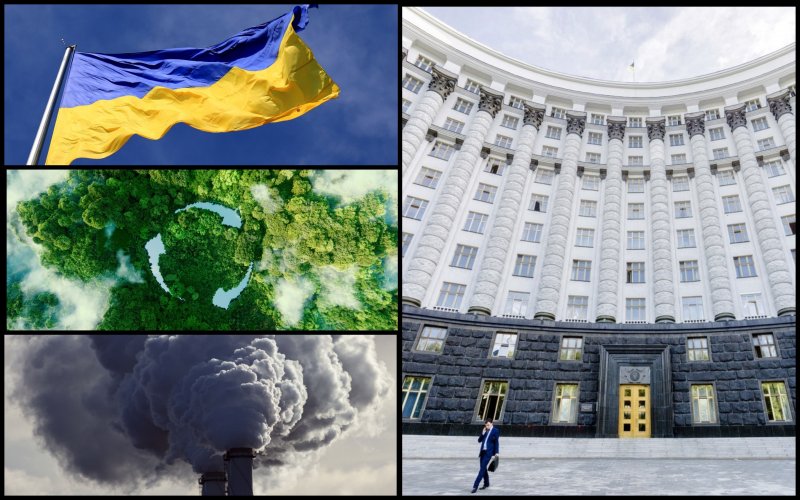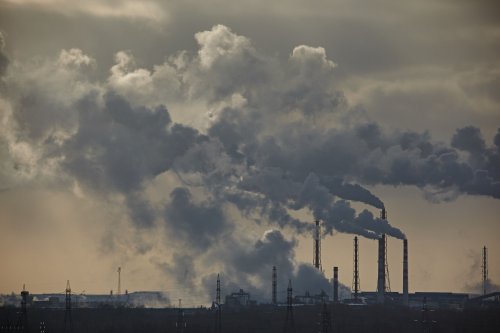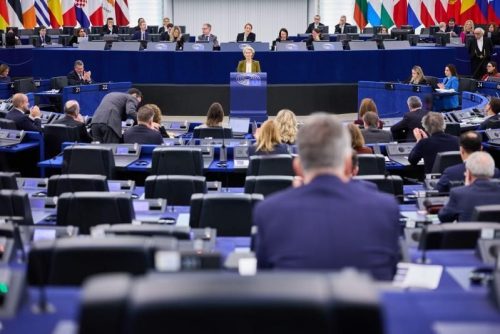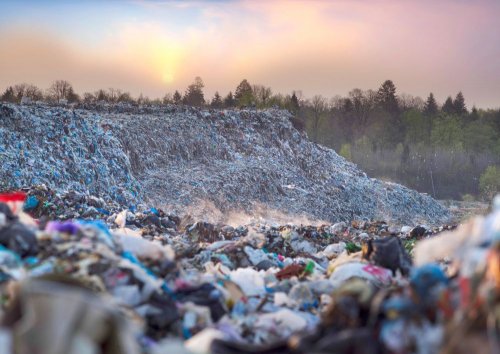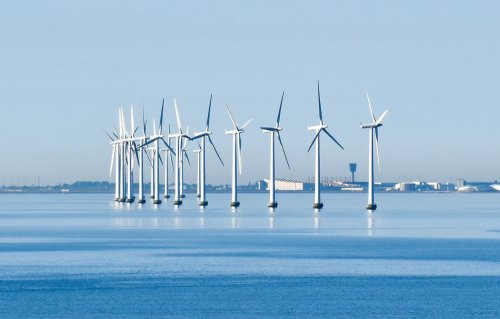Ukraine has been courageously resisting Russian aggression on all fronts, including the environmental one, for four months now. The main body pursuing the country's environmental policy is the Ministry of Environmental Protection and Natural Resources. The war caught him at the moment of reformatting and personnel changes. In February, performing
duties of the minister Ruslan Strilets , which already on April 14 officially appointed to office.
Many members of the eco-community, in particular representatives of business and environmental organizations, criticize the Ministry for allegedly failing to transform in a timely manner to the realities of war.
EcoPolitic decided to find out in what directions the environmental policy is being pursued in the state during the war and what the eco-community, business and the public think about it. More details - in the material.
Personnel policy at the Ministry of Environmental Protection
In May, the so-called personnel purge took place in the Ministry of Environmental Protection. As the newly appointed minister formed a new team, most of the people appointed by former minister Roman Abramovsky lost their positions.
Mikhail Khorev, Roman Shakhmatenko and Irina Stavchuk were dismissed from their posts, Alexander Krasnolutsky, Elena Kramarenko and Evgeny Fedorenko were appointed instead. As it turned out, some of them learned about their dismissal from the news. After that, the Ministry of Environmental Protection was accused of the fact that the decision on fundamental personnel steps do it secretly from the profile committee of Government. This opinion was expressed by the people's deputy from the "Sluga Naroda" and a member of the environmental parliamentary committee Elena Krivoruchkina.
She assured that, as a people's deputy and deputy chairman of the relevant committee, she would require the minister to report to the committee on the effectiveness of replacing so many government officials at the same time.
“It would also be interesting to hear what other changes we all expect in the personnel policy of this ministry in the future,” Krivoruchkina summed up.
In particular, Mr. Roman Shakhmatenko in a comment to EcoPolitic said that he was annoyed because he did not have time to finish many of the reforms he had begun.
Waste Law 2207-1d
On June 20, the Government of Ukraine adopted in the second reading the long-awaited draft law No. 2207-1-d "On Waste Management".
Ukraine is the dirtiest country in Europe. Approximately 33,000 tons of waste are buried in landfills and overcrowded landfills in Ukraine every day. More than 12 million tons per year. More than 90% of household waste is buried in landfills and only 3.2% is recycled, which does not meet European standards. Ukraine is the only country in Europe that does not implement the "polluter pays" principle and does not create extended producer responsibility organizations.
"Ukraine is finally taking the first step towards civilized waste management. We are already 20-30 years behind our European neighbors. In fact, today Ukraine is the only country in Europe where the state does not have control over waste, and more than 90% of them buried in the ground "Our goal is to be a full member of the European Union, so we must show the ability to carry out real European reforms," Strilets commented.
He explained that the framework law "On Waste Management" provides an opportunity to start the changes necessary for Ukraine to become a member of the European Union.
The law will allow:
- to introduce the European hierarchy of waste management;
- organize the planning of the waste management system at the national, regional and local levels;
- close old landfills, and bring the rest to European standards;
- create conditions for building a modern waste processing infrastructure in Ukraine according to European rules and open borders for investors;
- establish the "polluter pays" principle;
- introduce extended producer responsibility, where the manufacturer of the product will be obliged to ensure the full disposal of the packaging that he put on the market with the goods.
At the same time, the document received a lot of criticism in the expert community. In particular, Oleksandr Marikovskiy, Deputy Chairman of the Ecological Committee of the Government, promised show "rotten gut" law. Also the founder of the project "Ukraine without garbage" Evgenia Aratovskaya accused the developers of the bill No. 2207-1-d of incompetence, because of which the project manager of the waste management reform of the reform support team under the Ministry of Natural Resources, Tatyana Tevkun, threatens her with a lawsuit.
According to lawyers, the specified terms in the draft law are formulated in such a way that a citizen can be considered both an "owner of waste" and a "generator of waste", and this, accordingly, gives rise to legal uncertainty, unequal application of the legal norm and unlimited interpretation of it in law enforcement practice. Since the legal norms are not clearly formulated, which gives rise to legal chaos and inevitably leads to arbitrariness, and also contradicts the principle of the rule of law, one of the main elements of which is legal certainty, and this contradicts Article 8 of the Basic Law of Ukraine - the Constitution of Ukraine, because Ukraine recognizes and the principle of the rule of law applies.
Promotion to MOB and ETS
According to the Law of Ukraine "On the Fundamentals of Monitoring, Reporting and Verification of Greenhouse Gas Emissions", from January 1, 2021, a new system for regulating greenhouse gas emissions was to be introduced - a monitoring, reporting and verification system that would provide reliable data on the emissions of enterprises at the country level. However, in Ukraine, it has not fully earned. But it is precisely this that is the first stage in the creation of a greenhouse trading market (ETS).
Establishment of a trading market for greenhouse gas emission allowances in Ukraine's obligations under international treaties agreed to be binding by the Government of Ukraine, in particular the Association Agreement between Ukraine, on the one hand, and the European Union, the European Atomic Energy Community and their Member States on the other hand, as well as in compliance with the requirements of the United Nations Framework Convention on Climate Change and the Paris Agreement.
According to Stanislav Zinchenko, director of the GMK Center, after Ukraine received the status of a candidate for EU membership, the issue of harmonizing our legislation with the European one became even more important.
"It is very bad that preparations for the introduction of ETS in Ukraine have stopped. Therefore, many questions arise for the Ministry of Environmental Protection, and for our deputies, and for the experts who participated in this process. In fact, 1-2 general round tables were held, where they discussed the functioning of the ETS only theoretical. Although everyone understood that Ukraine, as part of the implementation of the ETS, should go the same way that Europe went, of course, with Ukrainian specifics, because our economy, energy and industry are somewhat different. Colleagues must see that we have gone on the adequate and transparent path that they themselves have traveled and according to the same rules. We have not seen a single movement in this direction. This, naturally, leads in the future and now to questions from European officials and business," the expert explained.
Connecting to LIFE
The other day it became known about the achievement - Ukraine joined the European LIFE program for climate and environment. What does this mean for our country? By joining LIFE, Ukraine can use part of the program funds for environmental development. Close those needs that Ukraine has never spent its own budgetary funds due to complex legislation.
"LIFE is a powerful financial instrument of the participating countries. Ukraine received great support from the European Union and enormous opportunities not only for the restoration of the environment after Russia's armed aggression, but also for the restoration of wildlife in Ukraine in general. This is what money has never been enough. We see what a terrible impact war has on the life of every Ukrainian. At the same time, this war has no less terrible impact on the environment. Take, for example, hundreds of thousands of tons of scrap remaining on the territory of Ukraine, forests that today they are largely mined and destroyed. We should already start thinking about their regeneration. It is these areas that the activities of the LIFE program will be directed to," commented the Deputy Minister of Environmental Protection and Natural Resources of Ukraine Yevhen Fedorenko during the GREEN ECONOMIC RECOVERY FORUM.
In its 30 years of operation, the LIFE program has co-financed more than 5,600 environmental projects in the EU and beyond. The program budget for 2021-2027 is 5.43 billion euros.
"For the Ministry of Natural Resources, the scale of this decision is comparable to Ukraine's accession to the European Union," Strilets said.
Calculation of environmental losses
Since the beginning of the war, Russian troops have been shelling oil depots and large industrial facilities throughout Ukraine. Heavy metals from shells and military equipment enter the soil and groundwater. A positive moment was the timely creation of the Operational Headquarters, which fixes the environmental crimes of the occupiers. Its experts collect photo and video evidence, use satellite imagery and, where possible, visit crime scenes and take samples for laboratory research.
The Ministry of Natural Resources enlisted the support of leading international law firms to prepare lawsuits against the aggressor country.
Ruslan Strilets has already stated that Ukraine could become the first country in the world to receive reparations for crimes against the environment. Together with environmentalists, the ministry carefully collects the evidence base of crimes.
Deregulation of business in the environment
During the 120 days of the war, the authorities made a number of decisions that should contribute to the deregulation of business in the environment. As it turned out, among the numerous measures taken "on paper", only two actually work: the ability to continue to operate / obtain permits based on the filing of a declaration and a moratorium on scheduled inspections. This is evidenced by the analysis of the members of the committee on industrial ecology and sustainable development of the European Business Association.
According to Olga Boyko, coordinator of the committee, other norms that are no less important for enterprises are either only on paper or make doing business even more difficult:
1) there is no possibility of exemption from payment of environmental taxes due to the unaccepted resolution of the Cabinet of Ministers of Ukraine on the list of territories where active hostilities continue/are prolonged, or are under occupation;
2) postponing the submission of reports and any other documents does not exempt from the need to comply with the environmental conditions defined in the conclusions of the environmental impact assessment and the implementation of post-project monitoring during martial law, which is impossible due to a direct threat to life;
3) resumption of unscheduled inspections by decision of the Ministry of Natural Resources in the presence of a threat that has a significant negative impact on environmental protection, despite the fact that such an impact can be interpreted in different ways;
4) the uncertainty of the implementation of the EIA procedure, the algorithm of which has been changed three times and, possibly, will continue to change.
The business community called for the above-mentioned initiatives to be finalized and to facilitate the implementation of such steps in deregulation:
- Revision of the procedure for the implementation of EIA (shorter timeframes, revision of activities, simplification of the requirements for the report and environmental conditions of the EIA conclusion, transition to electronic document management, post-project monitoring postponing).
- Moratorium on scheduled and unscheduled inspections, a moratorium on the elimination of violations specified in the instructions, and the elimination of legislative gaps during inspections.
- Moratorium on raising technological emission standards pollutants at stationary sources
- Settlement of the issue of the availability of territories where it is planned creation of objects of the natural reserve fund (NRF), in the list of subsoil plots, special permits for use which are put up for auction.
- Settlement land relations when providing subsoil plots into use.
- Reducing the number of approvals in the field of subsoil use (mining allotment, approval by local communities of the provision of subsoil plots for use, approval of the annual plan for the development of mining operations).
- Simplify reporting (statistical, electronic submission).
Regulation of the EIA procedure
The environmental impact assessment (EIA) procedure became the subject of heated debate in the eco-community during the war. After all, after the Russian invasion, the government closed access to the Register of Internal Affairs.
On March 15, the Verkhovna Rada adopted in general bill No. 7144 "On amendments to certain legislative acts of Ukraine concerning activities in the sphere of the environment and civil protection during the period of martial law". From the main: in the bill canceled the conduct of EIA during the implementation of restoration work to eliminate the consequences of armed aggression and hostilities.
However, the norm did not apply to the activities of businesses that do not conduct operations in the territory of hostilities.
According to the president of the Professional Association of Ecologists of Ukraine Lyudmila Tsyganok, in this way the implementation of most budget-forming types of economic activity was blocked.
"In fact, the placement in a closed register of documents without the possibility of public access to them, violates the basic principle of publicity of environmental impact assessment, levels the openness and accessibility of this assessment, and also violates the requirements of Directive 2011/92/EU", — Tsyganok explained.
A similar opinion was expressed in the European Business Association. Olga Boyko, coordinator of the Industrial Ecology and Sustainable Development Committee, hoped that the experience of promptly resolving problems with the EIA procedure during the pandemic, which was in 2020, would help.
“This time, the problem is more complex, because enterprises are physically unable to perform various stages of the EIA procedure provided for by law. For example, it is quite difficult to prepare a high-quality EIA report in terms of describing environmental factors in areas where active hostilities have continued or are ongoing, because this is potentially dangerous for the life and health of people who will conduct such field studies The situation is similar with regard to the implementation of post-project monitoring, but so far there are only clarifications from the Ministry of Natural Resources, which, unlike legislative acts, have no legal force, are of an informational nature, but do not solve problems," she said.
However, the Ministry has already stated that the head of the department, Ruslan Strilets, set the task of maintaining the EIA procedure, despite the conditions of martial law and the complexity of its implementation. And already on June 16 in Ukraine, with certain restrictions, the work of the Register of EIA was resumed.
What changed:
- the terms of public discussion have been extended from the closing date of the Register (03/22/2022) to the day of its opening;
- it is not required to re-publish messages about planned activities and announcements about the start of public discussion of the EIA report in the print media;
- the public can follow the progress of EIA procedures in the register and receive documents upon request after identification of the person.
The editors requested an extended comment on this and a number of other issues from the Ministry of Environmental Protection, but we did not manage to get it.
The other day there was news that in Ukraine it is planned to halve the number of ministries. In particular, the Ministry of Natural Resources and the Ministry of Agrarian Policy can liquidate them. Perhaps, given the results of work in the environmental direction, criticism from business and the public, it was not in vain that they thought about the liquidation of the ministry right now.

